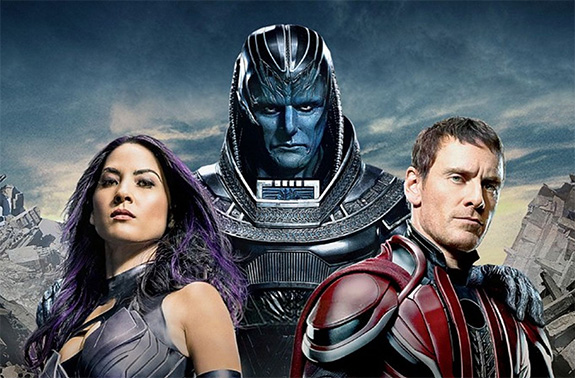

MPAA Rating: PG-13
USCCB Rating: A-III
Reel Rating: (2 out of 5 reels) ![]()
![]()
The latest venture in the X-Men franchise tempts fate with the subtitle Apocalypse—and loses. While the stakes are incredibly high, the film itself is terribly underwhelming. It’s not the worst in the series (that dishonor goes to X-Men Origins: Wolverine) but certainly near the bottom of the barrel. It has many problems, including an over-reliance on mutant superpowers and special effects rather than story and characters, which in an amusing way is a nostalgic throwback to the days before Christopher Nolan and the Marvel Cinematic Universe (MCU). After sixteen years and seven superhero movies in 2016 alone (not to mention television and Netflix), the genre is finally experiencing burnout.
The year is 1983, which means the first generation of X-Men (Magneto, Professor X, Beast) is middle aged while the second generation (Nightcrawler, Jean Gray, Cyclops) are just coming onto the scene in their late teens. This younger crowd of new mutants is the closest yet in tone and appearance to the classic ‘90s animated television show that made the X-Men a household name. The Professor’s school has been running smoothly for a decade after mutants were first revealed to the world in Days of Future Past. Now there is a new enemy that threatens not only the human world but the X-Men as well. In Egypt, an ancient mutant named Apocalypse has gathered four accomplices, including Magneto, with the goal of completely destroying the Earth and remaking it as a personal paradise. It’s not a creative scheme but lacks nothing in ambition.
The first thing that makes Apocalypse exceptionally worse than its predecessors is the title villain, made all the sadder by an uninspired performance by Oscar Isaac in perhaps the first bad role of his illustrious career. His origins involve a sloppy mix of Dan Brown and Erich von Däniken conspiracy theories. As the first mutant in existence, Apocalypse led the ancient Egyptians as a god. “I’ve been called many things over many lifetimes,” he tells Storm. “Ra, Krishna, Yahweh. I was there to spark and fan the flame of man’s awakening, to spin the wheel of civilization.” It is even suggested that St. John drew inspiration from Apocalypse’s followers in creating the Four Horsemen. While these connections seem silly, the implication are quite serious. It suggests that all religion is really just a misunderstanding.
Beyond his past, Apocalypse’s personality is insufferably boring. His motivations are unclear beyond simple megalomania. His powers are never well defined and he acts without emotion, almost like a machine rather than a creature. What made villains like Magneto and Mystique so compelling was their humanity; their evil actions were driven by deep pain and prejudice. While they had amazing abilities, they were still people. This struggle for mutant acceptance in a non-mutant world is the heart of the X-Men franchise. Professor X wants to live in peace and use their abilities to protect humanity. Magneto sees man as the enemy that must be stopped, by violence if necessary. It’s an effective motif but far overused by this point.
The only silver lining in an otherwise dull narrative is the hip personalities of the ‘80s teen mutants. Sporting Atari shirts and neon yellow sunglasses, they are a welcomed diversion from Apocalypse’s grey attitude and color scheme. My personal favorite is Quicksilver (Evan Peters) who once again steals the show through fast paced cinematography underlined by groovy beats. Yet even these characters are overshadowed by the constant focus on superpowers and 3D special effects. The climactic scene lasts about twenty minutes too long and mostly involves a display of Jean Grey’s telekinetic prowess rather than moral justice. No one is impressed anymore by the amount of CGI; instead, it is how the imagery is used to enhance the story which makes a film compelling. That’s how Ex Machina could win an Oscar for Visual Effects despite a budget of only $15 million.
Apocalypse was doomed from the beginning by the silly premise that this could be “the end.” Every man, woman, and mutant who has ever read a comic book knows that can’t happen, so why even pretend? Even Days of Future Past operated on a similar premise, but it had the advantage of superior writing and story structure. It is not enough to make a film hoping for fan devotion alone. It is the relationships among the characters that make all the difference. The only way for the genre to move forward is smaller films that focus on good stories—indie superhero flicks. Now that would be something.
If you value the news and views Catholic World Report provides, please consider donating to support our efforts. Your contribution will help us continue to make CWR available to all readers worldwide for free, without a subscription. Thank you for your generosity!
Click here for more information on donating to CWR. Click here to sign up for our newsletter.


